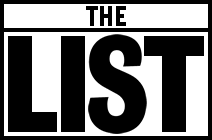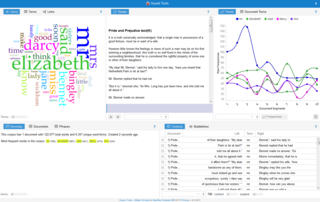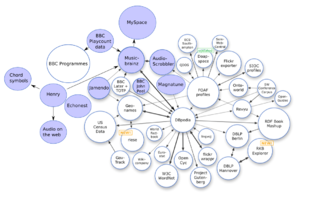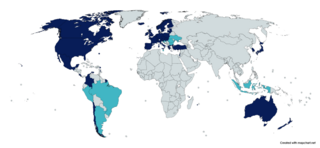Related Research Articles

The Campaign for Real Ale (CAMRA) is an independent voluntary consumer organisation headquartered in St Albans, England, which promotes real ale, cider and perry and traditional British pubs and clubs. With just over 150,000 members, it is the largest single-issue consumer group in the UK, and is a founding member of the European Beer Consumers Union (EBCU).
The World Wide Web Consortium (W3C) is the main international standards organization for the World Wide Web. Founded in 1994 and led by Tim Berners-Lee, the consortium is made up of member organizations that maintain full-time staff working together in the development of standards for the World Wide Web. As of 5 March 2023, W3C had 462 members. W3C also engages in education and outreach, develops software and serves as an open forum for discussion about the Web.

A digital object identifier (DOI) is a persistent identifier or handle used to uniquely identify various objects, standardized by the International Organization for Standardization (ISO). DOIs are an implementation of the Handle System; they also fit within the URI system. They are widely used to identify academic, professional, and government information, such as journal articles, research reports, data sets, and official publications. DOIs have also been used to identify other types of information resources, such as commercial videos.

The List is a digital guide to arts and entertainment in the United Kingdom.

The Stationery Office (TSO) is a British publishing company created in 1996 when the publishing arm of His Majesty's Stationery Office was privatised. It is the official publisher and the distributor for legislation, command and house papers, select committee reports, Hansard, and the London, Edinburgh and Belfast Gazettes, the UK government's three official journals of record. With more than 9,000 titles in print and digital formats published every year, it is one of the UK's largest publishers by volume.
The Good Food Guide has been reviewing the best restaurants, pubs and cafés in Great Britain since 1951.
In library and archival science, digital preservation is a formal endeavor to ensure that digital information of continuing value remains accessible and usable. It involves planning, resource allocation, and application of preservation methods and technologies, and it combines policies, strategies and actions to ensure access to reformatted and "born-digital" content, regardless of the challenges of media failure and technological change. The goal of digital preservation is the accurate rendering of authenticated content over time. The Association for Library Collections and Technical Services Preservation and Reformatting Section of the American Library Association, defined digital preservation as combination of "policies, strategies and actions that ensure access to digital content over time." According to the Harrod's Librarian Glossary, digital preservation is the method of keeping digital material alive so that they remain usable as technological advances render original hardware and software specification obsolete.

The University for the Creative Arts is a specialist art and design university in the south of England.

The Open Rights Group (ORG) is a UK-based organisation that works to preserve digital rights and freedoms by campaigning on digital rights issues and by fostering a community of grassroots activists. It campaigns on numerous issues including mass surveillance, internet filtering and censorship, and intellectual property rights.
ISEA International is an international non-profit organisation which encourages "interdisciplinary academic discourse" and exposure for "culturally diverse organisations and individuals working with art, science and technology."

Digital humanities (DH) is an area of scholarly activity at the intersection of computing or digital technologies and the disciplines of the humanities. It includes the systematic use of digital resources in the humanities, as well as the analysis of their application. DH can be defined as new ways of doing scholarship that involve collaborative, transdisciplinary, and computationally engaged research, teaching, and publishing. It brings digital tools and methods to the study of the humanities with the recognition that the printed word is no longer the main medium for knowledge production and distribution.

Open data is data that is openly accessible, exploitable, editable and shared by anyone for any purpose. Open data is licensed under an open license.
ENTSO-E, the European Network of Transmission System Operators, represents 39 electricity transmission system operators (TSOs) from 35 countries across Europe, thus extending beyond EU borders. ENTSO-E was established and given legal mandates by the EU's Third Package for the Internal energy market in 2009, which aims at further liberalising the gas and electricity markets in the EU.
Open Knowledge Foundation (OKF) is a global, non-profit network that promotes and shares information at no charge, including both content and data. It was founded by Rufus Pollock on 20 May 2004 in Cambridge, UK. It is incorporated in England and Wales as a private company limited by guarantee. Between May 2016 and May 2019 the organisation was named Open Knowledge International, but decided in May 2019 to return to Open Knowledge Foundation.
Dr Jerry Fishenden has been referred to as "one of the UK’s leading authorities in the world of technology", and appears regularly in a variety of mainstream media. He is also a frequent guest and keynote speaker on the conference circuit, drawing on his background across both private and public sectors.
Tony Hirst is an academic in the Department of Computing and Communications at the Open University, but better known for the OUseful Blog on practical applications of open data.

Joanna Shields, Baroness Shields, is a British-American businesswoman and politician. Having played key roles at several exited startups, Shields also served high-profile roles within big-tech companies, leading AdSense for Google in EMEA and later leading Facebook in the region.

Matthew Steven Gould is a British former civil servant and diplomat who is the Chief Executive Officer of international science-led conservation charity ZSL. He was previously National Director for Digital Transformation in NHS England (2019–2022), Director General for Digital and Media Policy in the Department for Digital, Culture, Media and Sport (2015–19) and Ambassador to Israel (2010–15).

The Organisation for Economic Co-operation and Development is an intergovernmental organisation with 38 member countries, founded in 1961 to stimulate economic progress and world trade. It is a forum whose member countries describe themselves as committed to democracy and the market economy, providing a platform to compare policy experiences, seek answers to common problems, identify good practices, and coordinate domestic and international policies of its members.
The UK Data Service is the largest digital repository for quantitative and qualitative social science and humanities research data in the United Kingdom. The organisation is funded by the UK government through the Economic and Social Research Council and is led by the UK Data Archive at the University of Essex, in partnership with other universities.
References
- ↑ "Williams Lea". Williams Lea. Retrieved 4 September 2013.
- ↑ "FAQs | TSO (The Stationery Office)". TSO. Retrieved 4 September 2013.
- ↑ Charles Arthur (24 March 2011). "OpenUp winner aims to make UCAS data available for prospective students | Technology". The Guardian. theguardian.com. Retrieved 4 September 2013.
- ↑ "UK Digital Technology takes another step – Open Data | Lucian J. Hudson, Director of Communications, The Open University – personal blog". Open.ac.uk. 26 March 2011. Retrieved 4 September 2013.
- ↑ "OpenUp Panel Chair Robin Brattel, shares the panel's 'judging thoughts' " TSO Open.Up Blog". Blog.openup.tso.co.uk. 1 April 2011. Retrieved 4 September 2013.
- ↑ Werbegeschenke (18 January 2010). "Q&A: Robin Brattel of Inapub.co.uk". Econsultancy. Retrieved 4 September 2013.
- ↑ Office of the e-Envoy (May 2002). "Guidelines for UK Government websites – Illustrated handbook for Web management teams" (PDF). TSO. Retrieved 4 September 2013.
- ↑ "Guidelines for UK Government Websites: Illustrated Handbook for Web Management Teams". Tsoshop.co.uk. 4 June 2003. Retrieved 4 September 2013.
- ↑ "Web Summit Exhibitors". blog.websummit.com. 6 October 2014. Retrieved 10 December 2014.
- ↑ "WeGoDo.com". www.wegodo.com. 10 October 2014. Retrieved 10 December 2014.
- ↑ "Food & Drink Innovation Network " Consumers Can Search For Real-Time Events in Pubs And Bars". Fdin.org.uk. 25 August 2009. Retrieved 4 September 2013.
- ↑ "Eight out of 10 use Google to plan night out". Morningadvertiser.co.uk. Retrieved 4 September 2013.
- ↑ "Pubs urged to take part in world record quiz attempt". Morningadvertiser.co.uk. Retrieved 4 September 2013.
- ↑ "Free online help to promote your Royal Wedding party". Morningadvertiser.co.uk. Retrieved 4 September 2013.
- ↑ Dredge, Stuart (1 August 2012). "Apps Rush: Now TV, Animate It, MY GPS, Weather HD 2, Mitt's VP, Breaking Bad, Knock Knock and more | Technology". theguardian.com. Retrieved 4 September 2013.
- ↑ "Promoting a dog friendly pub? There's an app for that". PubGenie. 1 May 2013. Archived from the original on 3 March 2016. Retrieved 4 September 2013.
- ↑ "News: Inapub and Archant get connected". InPublishing. 15 September 2011. Retrieved 4 September 2013.
- ↑ "BSME Awards 2012: The full shortlist". Press Gazette. Retrieved 4 September 2013.
- ↑ "Ideas for digital marketing" (PDF). Morning Advertiser Freehouse 500. 28 October 2010. Retrieved 4 September 2013.
- ↑ "Partners". Cambridgeshire.net. Retrieved 4 September 2013.
- ↑ "Eventility brings people, places and things we do together. Less online, more social!". Cambridge Network. 30 March 2011. Retrieved 4 September 2013.
- ↑ "EVENTILITY® New Subscriptions Collections and API Feature Makes Club and Group Organisation a Breeze". Uk.prweb.com. 4 April 2012. Retrieved 4 September 2013.
- ↑ D'Mello, Anasia (28 November 2019). "Iotic raises €7.5mn to drive growth of digital twin technology used by Rolls-Royce Power Systems and Bam Nuttall". IoT Now. Retrieved 27 February 2020.
- ↑ "About CSN Members " Collaborative Strategies Network". Tocollaborate.org. 16 June 2010. Retrieved 4 September 2013.
- ↑ "Collaborative Strategies Network". Tocollaborate.org. Retrieved 4 September 2013.
- ↑ Geere, Duncan (24 March 2011). "UCAS data release could spur open data innovation (Wired UK)". Wired.co.uk. Retrieved 4 September 2013.
- ↑ "TechHub". TechHub. Retrieved 4 September 2013.
- ↑ Phil Muncaster. "V3.co.uk". V3.co.uk. Retrieved 4 September 2013.
- ↑ "International Confex & Live Experience 2013 – Robin Brattel". International-confex.com. 21 March 2013. Retrieved 4 September 2013.
- ↑ "Warwick London Alumni Network – Growing and Exiting a Business". Wbs.ac.uk. 18 September 2012. Retrieved 4 September 2013.
- ↑ "It's Collaboration August!". CamCreative. 6 August 2012. Archived from the original on 10 September 2013. Retrieved 4 September 2013.